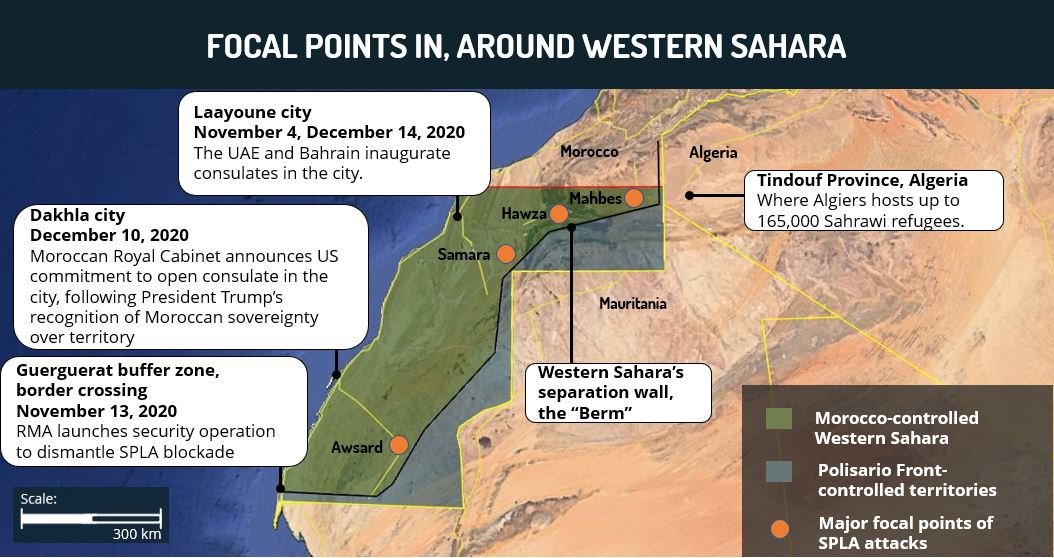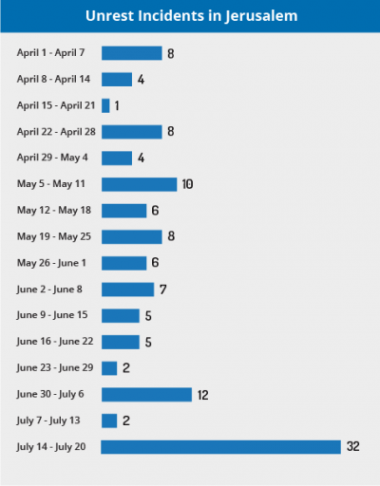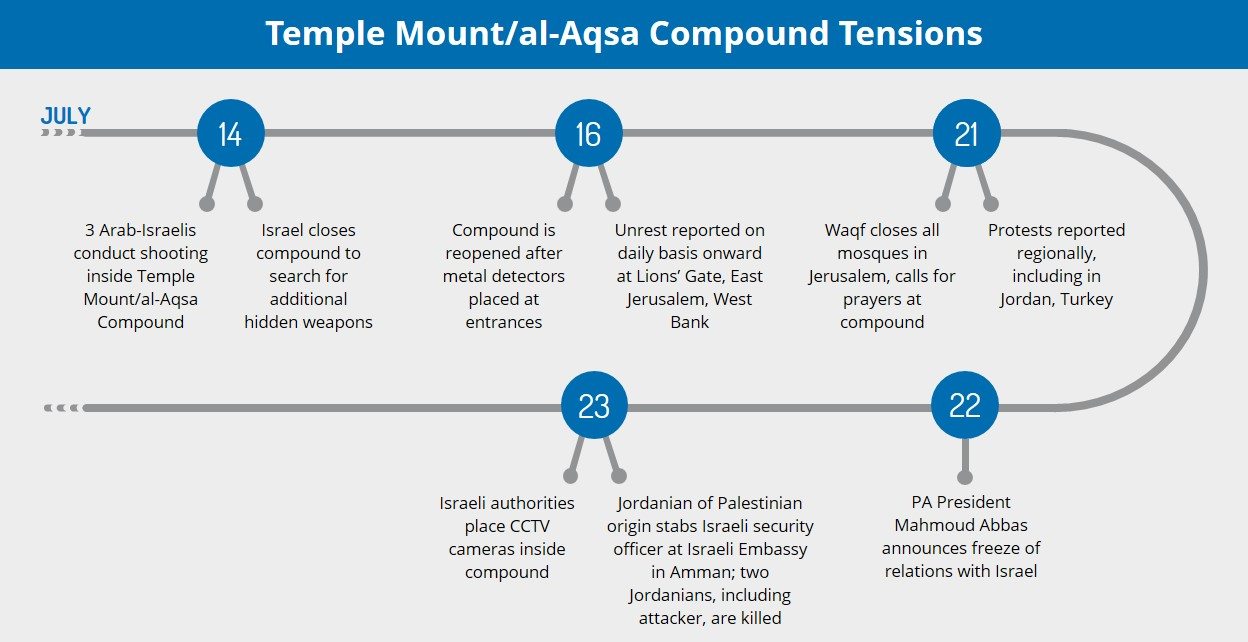Executive Summary:
On December 10, US President Donald Trump announced that Morocco and Israel had agreed to normalize relations. This adds to the growing trend of Arab states that are willing to establish diplomatic ties with Jerusalem as part of a US-brokered process. The agreement has the potential to yield benefits for both countries. Morocco will likely seek to leverage the normalization agreement to gain greater access to US economic and military support.
Also on December 10, in a move likely linked to Rabat’s willingness to officially establish full diplomatic relations with Israel, President Trump signed a proclamation recognizing Moroccan sovereignty over the disputed territory of Western Sahara. He also expressed Washington’s support for Rabat’s preferred autonomy proposal for the area.
This comes amid an already volatile situation in Western Sahara following renewed tensions between the Polisario Front Sahrawi separatist organization and Morocco. The Front is likely to perceive Washington’s support for Rabat’s claim as undermining its cause and may therefore seek to escalate the scope and scale of recently claimed near-daily attacks against Moroccan forces.
Avoid all travel to the border areas with Western Sahara, especially areas along the security barrier between Morocco- and Sahrawi People’s Liberation Army (SPLA)-controlled territory, due to the ongoing hostilities and the potential for further escalations.
Current Situation
Morocco-Israel normalization
On December 10, US President Donald Trump announced that Morocco and Israel have agreed to normalize relations and resume full diplomatic ties, including the reopening of liaison offices in Rabat and Tel Aviv.
On December 10, the Moroccan Royal Cabinet stated that given “the special ties…[between] the Jewish community of Moroccan origin, including in Israel” and the Moroccan monarch, the latter intends to authorize direct flights for Israeli tourists, to and from Morocco; resume full diplomatic relations with Israel; and promote economic and technological relations, including by reopening liaison offices.
US recognition of Moroccan sovereignty over Western Sahara
Simultaneously on December 10, President Trump also signed a proclamation recognizing Moroccan sovereignty over Western Sahara, stating that “Morocco’s…autonomy proposal is the only basis for a just and lasting solution…[in the region]”.
The proclamation ended a decades-long US policy of adhering to a UN-led position which calls for a referendum in Western Sahara over self-determination, to which Morocco opposes.
The Moroccan Royal Cabinet press release from December 10 stated that the US has also committed to open an American consulate in Western Sahara’s Dakhla, with an economic focus, “in order to encourage American investments”.
The separatist Western Sahara-based Polisario Front organization declared that the recognition of Moroccan sovereignty over Western Sahara by the US has no effect and remains illegal under international law.
Assessments & Forecast
Normalizing of Morocco-Israel relations constitutes diplomatic, economic achievements for both countries
The Moroccan recognition constitutes the fourth instance whereby an Arab state has recognized and agreed to fully normalize relations with Israel over recent months, starting with the signing of the “Abraham Accords” on September 15 by the UAE and Bahrain. This was followed by a Sudanese commitment to normalize ties with Israel on October 23. In this context, although Morocco already reportedly maintained some overt and covert ties with Israel, including limited trade, an entry permit to Israeli nationals, and covert security cooperation, the proclamation constitutes a notable development. FORECAST: The agreement will assist the Israeli government to project the sustained momentum in Arab recognition of Israel and the benefits of full diplomatic relations with Jerusalem. The Israeli government may also capitalize upon Morocco as a gateway to develop diplomatic and economic relations with other African states. This is given that Morocco maintains influence over several countries in the continent and is currently the most prominent African investor in the West Africa region, according to the US State Department.
FORECAST: The development will also bolster the economies of both countries. It will boost trade between the parties, with Israeli businesses constituting a source of foreign investment in Morocco, which the Kingdom strives to encourage amid a prolonged economic crisis. Such investments will likely come in the form of joint ventures in the fields of agritech, water management, and renewable energy. These are prominent fields where Israeli companies maintain know-how and in which Moroccan authorities seek bolstered development as part of their strategic planning. The value Rabat attributes to these sectors has significantly increased in recent years as the country has been facing a severe drought that includes the gradual depletion of water sources. This has adversely impacted farmers in Morocco and the agricultural sector as a whole, which accounts for a significant share of Morocco’s workforce and GDP.
FORECAST: Furthermore, direct flights between Israel and Morocco, albeit depending on the containment of the COVID-19 pandemic, will boost tourism, another significant pillar of Morocco’s GDP. This will partially be based on the fact that approximately a million Israeli nationals have full or partial Moroccan roots, and that Morocco constitutes a focal point for Jewish heritage trips. In addition, Morocco is a relatively large exporter of agricultural products, phosphates, and other materials, such as textiles, which will now be more freely available to Israeli importers, potentially positively impacting the cost of living in Israel.
Morocco likely to aim to leverage normalization agreement with Israel to gain greater US military, economic support
The development will also likely benefit Morocco in terms of US financial investment and arms sales with Morocco. Recent events indicate that under the current US administration, the process of normalization with Israel is likely to benefit the participant countries in the form of more favorable access to procurement of sophisticated US arms. This was most saliently illustrated by the US Senate’s December 9 approval of the sale of sophisticated F-35 aircraft and Reaper unmanned aerial vehicles (UAVs) to the UAE, less than three months after it signed the Abraham Accords. In this context, Rabat likely perceives, or even may have received direct indications from the US administration, that its ability to acquire qualitative US-made arms is pending upon an accord to normalize relations with Israel. This assessment is supported by reports indicating that Rabat is indeed currently negotiating the purchase of sophisticated UAVs with Washington. Rabat’s position has likely been bolstered in this regard by its willingness to publicly recognize and reach an agreement with Jerusalem in a US-brokered agreement. Such acquisitions are important for Rabat as it seeks a qualitative buildup of its military capabilities, primarily through the US.
Furthermore, the Moroccan statement that the US will open a consulate in Western Sahara’s Dakhla, with a primarily economic focus, implies that Washington has indeed committed to financially reward Rabat by promoting American investments in the region, including in disputed territory. This assessment is further supported by reports that indicate that the Trump administration has also committed to supporting direct financial investment of three billion USD that will be spent on banks, hotels, and a renewable energy company in the Kingdom. As the Moroccan economy has been struggling against the backdrop of the COVID-19 pandemic, including in the aforementioned fields, this likely served as another significant impetus driving Rabat towards normalization. In addition, putting the economic benefits aside, the opening of a US consulate in Dakhla represents additional significance given its location in Western Sahara. It would constitute another political and symbolic recognition of Rabat’s sovereignty over the territory, including its large phosphate deposits and rich offshore fisheries, which US companies and investors likely seek access to.
FORECAST: That said, US investments in the aforementioned fields may be hindered by two political processes in Washington. First, the forthcoming administration change under which a President-elect Joe Biden-led administration is likely to negatively view the Trump administration’s derailment from the UN-led position on Western Sahara and may further seek to mitigate the diplomatic repercussions of it. Secondly, party control over the currently Republican-dominated US Senate will only be confirmed during January 2021. This will affect dynamics within the US pertaining to the sale of arms to Morocco. This dynamic, however, will likely prompt the incumbent administration to hasten commitments previously made, including arms deals, to see its policy through over the coming several weeks.
The American recognition of Morocco’s sovereignty over Western Sahara was likely a major part of Rabat’s willingness to formalize ties with Israel and will be considered by its leadership and much of the populace as a significant diplomatic achievement for the country. FORECAST: Rabat therefore will likely see through its newly-made commitments with regards to establishing relations with Israel. This is despite the fact that the decision to normalize relations with Israel has resulted in domestic tensions in Morocco. This is primarily between the Moroccan monarchy on one side, which has committed Morocco to the move, and the Islamist Justice and Development Party (PJD), which has led the Moroccan government since 2011, as well as other Islamist parties and institutions, on the other, which oppose any relations with Israel. The latter has been bolstered by a series of protests that have been forcibly dispersed by Moroccan security forces, which is indicative of both the opposition to the agreement among segments of the local populace and the authorities’ attempts to quell any dissent.
US recognition of Moroccan sovereignty over Western Sahara to increase tensions between Morocco, Polisario Front; may escalate scope of fighting in region
The US declaration occurred against the backdrop of an already volatile security situation in Western Sahara. The Sahrawi People’s Liberation Army (SPLA), the armed wing of the Polisario Front, has been engaged in near-daily artillery shelling against Royal Moroccan Army (RMA) positions along the security barrier in Western Sahara. These attacks have been occurring daily since November 13, when the RMA launched a security operation in the Guerguerat buffer zone to prevent the Polisario Front from blocking the border crossing with Mauritania, the main commercial artery between Morocco and West Africa.
Tensions were also heightened by the decision of several governments to open consulates in the Morocco-controlled Western Saharan city of Laayoune. Most significantly, the UAE inaugurated a consulate in the city on November 4, becoming the first Arab state to effectively recognize Moroccan sovereignty over the disputed territory. The Emirates were followed by Bahrain on December 14. The Polisario Front is therefore likely to perceive the new US stance, as well as the openings of foreign consulates within Western Sahara that essentially recognize Morocco sovereignty over the area, as detrimental to its aspirations for self-determination. FORECAST: The Polisario Front will therefore likely seek to escalate its military efforts against Morocco. This may include an increase in the intensity of artillery shelling against RMA positions along the security barrier in both quantitative and qualitative terms, and possibly even result in ground offensives against RMA positions, as a means of signaling that Morocco is bound to pay a price for its alleged “provocations” and violation of the 1991 ceasefire.
FORECAST: The Polisario Front may also proclaim a no-fly zone over Western Sahara, potentially implying that international commercial flights over the territory are under threat. Such actions are not unprecedented, as was highlighted on October 28, 2018, when Polisario Front officials reportedly claimed the deployment of surface-to-air missile systems along the “Berm” and issued warnings to foreign commercial airliners not to operate in the region.
FORECAST: While the Front is unlikely to deliberately target commercial airlines to prevent an international backlash that will undermine its reputation and credibility, it may seek to issue such warnings to project that the new US stance has made the security environment of the region volatile. This may be used by the Polisario Front as leverage during future negotiations sponsored by international stakeholders such as the UN and the African Union (AU), both of which have denounced the US’s unilateral move and called for talks to solve the conflict. Furthermore, the Polisario Front’s ability to project that the security environment of the region has deteriorated will be of value to the Front especially against the backdrop of the forthcoming change in US administrations, whereby it will seek a reversal of President Trump’s policy stance by the forthcoming Biden administration. Regardless, localized on ground hostilities between the SPLA and RMA will persist, and potentially even escalate amid the increased political tensions over the future of Western Sahara, over the coming months.
US recognition of Moroccan sovereignty over Western Sahara, Moroccan normalization with Israel, to increase geopolitical tensions in Maghreb region
Meanwhile, the new US stance will likely impact geopolitical dynamics in North Africa and trigger tensions with regional powers, primarily Algeria, the chief political and military backer of the Polisario Front. This support includes the hosting of up to 165,000 Sahrawi refugees in refugee camps in Algeria’s Tindouf Province along its southwestern border with Morocco. In this context, the proclamation may undermine any diplomatic achievement that may have been gained during former US Defense Secretary Mark Esper’s official visit to Algeria, the first visit by an American defense secretary to Algeria in 14 years. FORECAST: Against the backdrop of the underlying enmity between Algeria and Morocco and the former’s significant support for the Polisario Front, the new development may set the US and Algeria further apart and may also push Algeria to increase its military support for the SPLA.
More broadly, Algeria may be joined in its opposition to the US declaration by other regional actors who have been known to support the Polisario Front and also significantly oppose the normalization process with Israel, such as Iran. In this context, the new development in Moroccan-Israeli relations will be regarded by such actors as confirmation of the perception that Morocco has joined the ranks of an emerging alliance consisting of the US, Israel, and several Arab states, including the UAE, Bahrain, and Saudi Arabia. This alliance, according to Iran, poses a threat to the Islamic Republic’s national security and constitutes a US-spearheaded measure to hinder its own interests in the Middle East. FORECAST: Hence, the development may increase these actors’ motivation to hinder Moroccan interests, potentially by way of a bolstered military support to the Polisario Front. In the case of Iran, allegations of its support to the Polisario Front have already resulted in the severing of ties between Tehran and Rabat by the latter during 2018, when it accused Iran of providing funds, training, and weapons to the Polisario Front.
Recommendations:
Travel to Rabat, Casablanca, and Marrakech may continue while adhering to security precautions regarding crime, civil unrest, and militancy.
Avoid all travel to border areas with Western Sahara, especially areas along the security barrier between Morocco- and SPLA-controlled areas in the territory given the ongoing hostilities and the potential for further escalations in the region over the coming weeks.
It is advised to avoid conducting nonessential flights, particularly of low altitude, over Western Sahara, given the elevated threat that the fighting may pose to civilian aircraft. Those conducting essential travel in the area are advised to maintain cruising altitudes higher than at least 7 km.
In major cities, remain vigilant in the vicinity of public squares, government buildings, Jewish community centers, and police stations, as these areas serve as focal points for protests and militant attacks. Alert authorities to unattended or otherwise suspicious packages or baggage, particularly in crowded areas.
Consult with us at [email protected] or +44 20-3540-0434 for itinerary-based consultation and on-ground contingency support options.




